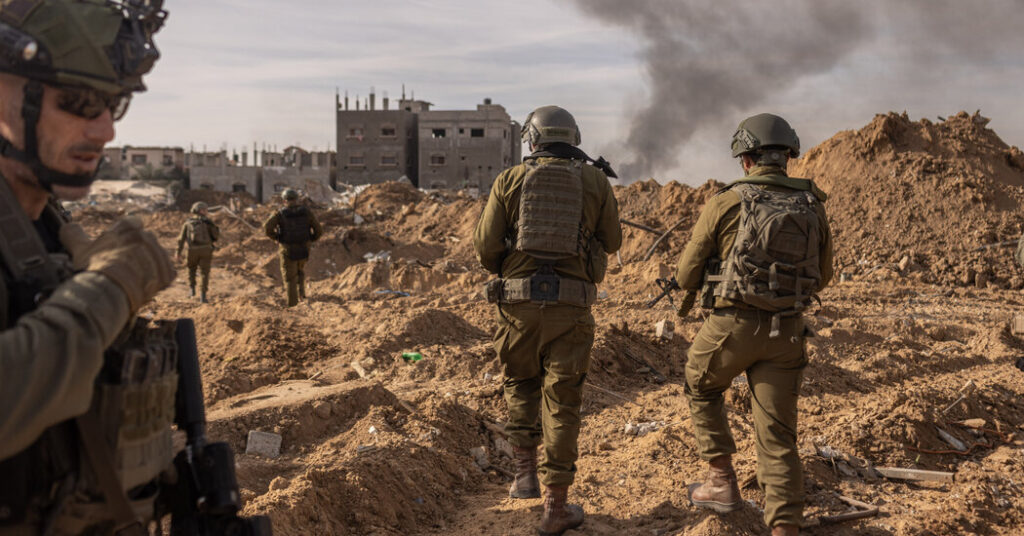Israel will mobilize thousands of reserve soldiers to bolster its campaign against Hamas in the Gaza Strip, the military announced on Saturday night, as the country appeared poised to expand its offensive in the Palestinian enclave.
The call-up suggested the Israeli government was preparing to shift tactics in an attempt to force Hamas to agree to its terms for an end to the war. It is unclear whether that would prove successful, as Hamas has fought a determined insurgency through more than a year of Israeli operations in Gaza.
Israel’s security cabinet, chaired by Prime Minister Benjamin Netanyahu, was set to meet on Sunday to formally sign off on broadening the campaign in Gaza, said an Israeli official, who spoke on condition of anonymity because they were not authorized to speak publicly.
The mobilization announcement compounded fears in Gaza, where Israel has barred food, medicine and other humanitarian aid from entering for over two months. Reeling from more than a year of hunger and fighting, many are still displaced or living amid the rubble of their homes.
After Israel ended a two-month cease-fire with Hamas in mid-March, Israeli forces resumed attacking across the enclave. But while Israel jets and drones have regularly bombarded Gaza from the air, Israeli ground forces slowed their advance after seizing some territory.
More than 50,000 people have been killed in Israel’s military campaign against Hamas in Gaza, according to Gaza health officials. They do not distinguish between combatants and civilians, but their tallies include thousands of children.
The war began after Hamas led a surprise attack on Israel on Oct. 7, 2023, which killed about 1,200 people and saw roughly 250 taken back to Gaza as hostages. In the aftermath, Israeli leaders vowed to destroy Hamas in Gaza and free all of the captives held there.
Despite more than a year of devastating war, Israel has yet to fully achieve either of those aims. Although Israel managed to kill many of Hamas’s leaders, the Palestinian militants have fought a stubborn war of attrition, recruited new fighters to their cause and are believed to still hold up to 24 living hostages and the bodies of dozens of others.
Earlier in the war, Israeli troops swept through the enclave, leveling swathes of Gaza’s cities and displacing hundreds of thousands of Palestinians. But they frequently returned to different areas, over and over, to confront what they called a renewed Hamas presence there.
International mediators, including the Trump administration, have sought to broker a new cease-fire between Israel and Hamas to free hostages in exchange for Palestinians in Israeli prisons. But the two sides have stipulated seemingly contradictory conditions for a deal.
Israel has demanded that Hamas lay down its arms, which the group has refused to do. Hamas, for its part, has said it will not free any more of the hostages until Israel commits to an agreement that includes a complete end to the war and a full withdrawal from the Gaza Strip.
The call-up announcement also sparked deeper anxiety among the hostages’ families, who fear that the fighting could kill their loved ones. They have sought to rally Israelis to pressure the government into reaching a new truce with Hamas.
Yotam Cohen, whose brother was abducted during the Hamas-led assault, accused Mr. Netanyahu of breaking the previous cease-fire before leading the country into a renewed, avoidable war with Hamas. He called for an immediate deal with Hamas to free his brother, who is still believed to be alive.
“Instead of bringing him home in an agreement, Netanyahu is sending soldiers into a war that will kill him,” Mr. Cohen said at a rally on Saturday.
Mr. Netanyahu has suggested that bringing home the remaining hostages is less important than decisively defeating Hamas. In interviews and speeches, Mr. Netanyahu has promised the Israeli public “absolute victory” over the group.
Freeing the captives was “an important goal,” Mr. Netanyahu said in an address on Thursday. “But in war there’s a supreme goal, and that is defeating our enemies,” he added.
Israel’s military leans heavily on its pool of reservists, many of whom have served for months — with some doing multiple tours of duty — since the war began.
But those ranks have seen simmering dissent against the government’s conduct of the war. Last month, a group of Air Force reservists and retired officers signed a public letter urging a deal with Hamas to return the hostages, even at the price of stopping the war in Gaza.










More Stories
Oil Prices Are Falling. Here’s Where That Could Spell Trouble.
Ukraine Rejects Russian Call for a Three-Day Cease-Fire
Hikers Stumble Upon a Pile of Gold Coins, Igniting a Historical Hunt